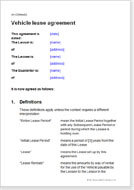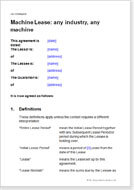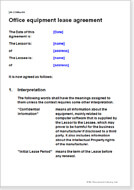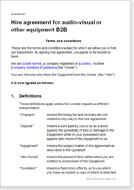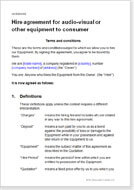This set of plant and equipment leases should enable any business to hire or lend spare vehicles, equipment and plant to any other business regularly - or to consumers infrequently - on a short term or long term basis. The basic structure of each is similar. The main differences are in the commercial detail, making each one easy to adapt for any particular piece of plant and all types of equipment.
Vehicle lease agreement
Whether you are an organisation or an individual, you can use this agreement to lease a car or any other vehicle to a business.
The vehicle could be of any size or type, for example: a delivery scooter, a motorbike, a small car, a flatbed lorry, or a forklift truck.
The term of the lease can be as short or long as you like, from days to years. We suggest a short period so that the contract can be renewed and terms (such as the rental amount) can be updated.
This document is not suitable to use if your business is leasing cars and vehicles to consumers, regulated by Consumer Credit Act 1974 amended to date.
Examples of use might be:
- a company owner who leases his personally owned car to his company
- a company with an unused delivery van who leases it to another business
- short term holiday car rental (this industry is not regulated)
- a supporter of a charity or not-for-profit organisation who leases its minibus to the organisation
- within a group of companies to move profit around the group for any reason
Machine Lease: any industry, any machine
Use this agreement for leasing heavy plant and machinery to another business.
It is a comprehensive, flexible document suitable for any type of machine or construction plant, whether used in industrial use, such as a water jet cutter or bending machine, or whether used in the construction industry, such as a crane or excavator.
Important to this agreement is that the plant can be moved and will be stored under the control of the lessee.
The document includes an optional provision to allow your lessee to purchase the machine after a certain time.
Office equipment lease agreement
Use this agreement to lease small plant and machinery to another business.
Equipment leased might be:
- office equipment, such as furniture or air conditioning units
- IT equipment such as computers, telephones and other electronic devices
- construction and landscaping equipment, such as tools, mowers, strimmers and chainsaws
- light industrial equipment, such as sewing machines or finishing tools
The document can be used for both short and long term leases.
We include the option for purchase of the equipment after a certain time, i.e. you can edit it to be a finance lease or an operating lease.
Hire agreement for audio-visual or other equipment B2B
This is a set of terms and conditions for a business that hires out technical equipment such as audio-visual or IT equipment to use with clients who are other businesses.
You can also use this document to:
- establish ownership and liability between companies in a group
- hire out any product as a one-off agreement between two businesses
Using a professionally drawn document will give you the confidence to know that your valuable goods have the best possible legal protection.
The document includes alternative options for:
- draft quotations
- responsibilities for delivery and return
- payment provisions, include running credit account terms
Hire agreement for audio-visual or other equipment
These are terms and conditions for a business that hires goods or equipment to consumers.
The document is suitable for a wide range of products, from garden machinery to clothes, although drawn for audio-visual equipment as an example.
You could be in the equipment rental business or simply rent out spare equipment from time to time. This is a flexible and adaptable agreement.
The agreement is similar to our B2B version, but includes full provision for compliance with the Consumer Contracts (Information, Cancellation and Additional Charges) Regulations 2013 and correspondingly extensive notes to advise you.
You might send out these terms with a quotation or place them on your counter, ready for a customer to sign. You can also adapt them for use on your website.

If the document isn’t right for your circumstances for any reason, just tell us and we’ll refund you in full immediately.

We avoid legal terminology unless necessary. Plain English makes our documents easy to understand, easy to edit and more likely to be accepted.

You don’t need legal knowledge to use our documents. We explain what to edit and how in the guidance notes included at the end of the document.

Email us with questions about editing your document. Use our Lawyer Assist service if you’d like our legal team to check your document will do as you intend.

Our documents comply with the latest relevant law. Our lawyers regularly review how new law affects each document in our library.
What is an equipment lease agreement?
If you have spare plant and/or equipment you might consider renting or loaning it to another business. Doing so may generate extra revenue for you or you may be able to pass obligations for repair and maintenance to the business that rents it. There may be tax benefits that make it attractive to the leasee to pay rent rather than having owning the asset on the balance sheet.
An equipment lease agreement is a legally binding contract that sets out the terms under which equipment of any type is rented to another business, including the obligations of the owner and of the renter, including for payment and maintenance.
An equipment lease agreement may also be referred to as an equipment rental agreement, an equipment hire agreement or an equipment loan agreement.
Who should use an equipment rental agreement?
They could be used by the following:
- B2B vehicle, plant or equipment rental service providers
- construction companies or contractors with spare machinery
- specialist equipment rental companies hiring infrequently used tools to businesses
- vehicle fleet management businesses
- long-term business equipment rental companies (whether cameras to professional photographers, or laptops to professional consultants)
- a business leasing equipment to another business in the same group
With the exception of the audio-visual B2C agreement, these are business to business rental agreements. They do not comply with the Consumer Credit Act 1974 and so are not suitable for businesses who are in the business of leasing equipment to consumers.
What types of equipment might be leased under these contracts?
The legal framework of each of our equipment lease agreements is largely the same. What differs between them are practical provisions that vary depending on how easily (or not) the subject matter can be moved.
The subject matter could be:
- heavy machinery or plant, such as machines for manufacturing large parts
- heavy duty construction vehicles such as cranes, bulldozers and diggers
- cleaning tools such as industrial vacuum cleaners
- agricultural equipment such as harvesters
- office equipment and appliances for business use
- medical devices
What should you consider when leasing equipment?
Description of the rented equipment
Identifying the equipment is important, especially if there are several pieces that are similar. The lessor will want to make sure that the equipment is returned at the end of the rental period in an expected condition, and the lessee will want to make sure that they are not charged for damage that existed before the lease started.
You should record the make, model and any serial number, and any current identifying characteristics such as scratches on paintwork.
The lessor and lessee should also agree an estimate of current value, which could form the basis of calculation for damages.
Wear and tear
Wear shold be anticipated. What exactly is fair wear is subjective. As far as possible, you should agree in advance what condition the equipment should be returned in (for example, with new tyres or certain parts replaced) and what constitutes good repair.
You could also specify who is responsible for keeping equipment in good condition - it is possible that maintenance is carried out by the lessor or an appointed agent.
Rental period
There is no restriction on the lease term, that is the period of time that the equipment is rented. It may be a fixed term for a specific period, or a periodic term (for example, a month to month basis).
Timing and amount of rental payments
You have a great deal of flexibility with the amount of rent and the timing of payments. There could be a single payment in advance for a fixed term, or multiple payments in arrears each month if the equipment is rented on a periodic basis.
The lessor may impose interest and payment of late charges if a due date for payment is missed.
Payment details
Information about how the rental payment and any security deposit and service charges should be made could be included in the contract or given separately.
Restrictions on how the leased equipment may be used
While it might seem obvious how the equipment is to be used, the hirer (or one of their employees) may decide on a use of the equipment for a purpose not intended. It may be difficult to list all circumstances in which it shouldn't be used, so it may be better instead to list when it can be used and then note that any other purpose is not allowed.
Indemnities
The two parties can agree that expenses incurred by the owner arising from the hirer's breach of contract, misuse of the equipment, any accident or failure to pay taxes or fees can be recovered.
Insurance
Accidents do happen. The hirer may keep an insurance policy in place, but there may also be an obligation obligation to the extent permitted on the hirer to take out an insurance policy so that they can also be responsible for loss, theft or damage. The insurance coverage by the hirer could then be reduced.
Using the formatting facilities of Word more effectively i.e. TOC, Headings etc would improve the format and editing of the document
All rights reserved

